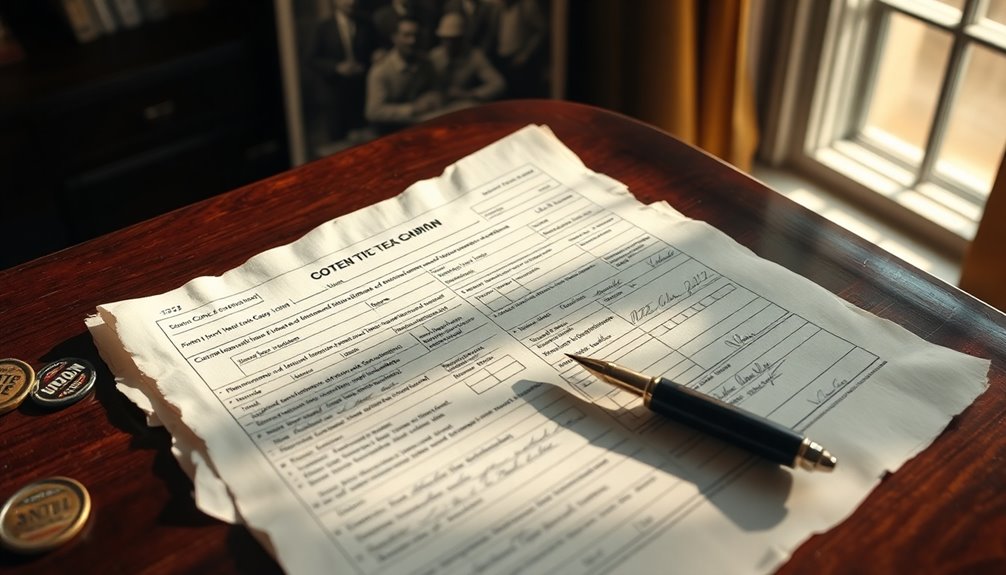You can't currently claim union dues as a deduction on your federal taxes from 2018 to 2025, thanks to the Tax Cuts and Jobs Act. This change has left many employees without this useful tax benefit. However, there are exceptions for some groups like Armed Forces reservists and self-employed individuals, who can still deduct dues as business expenses. State laws vary, and some states allow union dues deductions on state returns. Keeping track of your documentation is key if you want to maximize any potential tax benefits. Find out more about your options and nuances of tax laws.
Key Takeaways
- Most W-2 employees cannot claim union dues on federal taxes from 2018 to 2025 due to the TCJA's suspension of miscellaneous deductions.
- Self-employed individuals can deduct union dues as business expenses on Schedule C, directly impacting their tax planning.
- Some states, like New York and California, allow deductions for union dues on state tax returns, differing from federal regulations.
- Accurate record-keeping, including receipts and pay stubs, is essential to substantiate claims for any deductions related to union dues.
- Consulting a tax professional can help navigate complex regulations and ensure you maximize available deductions, including those related to union dues.
Current Federal Tax Law

When it comes to claiming union dues on your federal tax return, it's important to keep in mind that most W-2 employees can't take this deduction for tax years 2018 through 2025. This change stems from the Tax Cuts and Jobs Act (TCJA) of 2017, which suspended all miscellaneous itemized deductions, including union dues.
Even if you itemize your deductions, you won't be able to include union dues, affecting the majority of W-2 employees. However, there are exceptions for certain professions. If you're an Armed Forces reservist, a qualified performing artist, or a fee-basis state or local government official, you can still deduct unreimbursed employee expenses, including union dues. To do this, you'll use Form 2106, "Employee Business Expenses." Additionally, disabled individuals with impairment-related expenses can also deduct certain costs, though these exceptions don't apply to most employees.
For self-employed individuals, including freelancers and business owners, union dues can be deducted as business expenses on Schedule C of your tax return. It's also crucial to maintain accurate records of your dues and related expenses, as accurate record-keeping ensures you can substantiate your claims if tax laws change. Just remember to keep accurate records of your dues and related expenses, as deductions won't apply if dues are waived or covered by someone else.
Historical Context of Deductions

Understanding the historical context of deductions helps clarify how union dues have been treated over the years. Before the Tax Cuts and Jobs Act (TCJA) was enacted in 2017, union dues were classified as unreimbursed employee business expenses. You could deduct these expenses on your federal tax return if you itemized, provided they exceeded 2% of your adjusted gross income (AGI). This included other miscellaneous deductions like professional society dues and work-related clothing.
However, the TCJA, signed into law on December 22, 2017, suspended miscellaneous itemized deductions, including union dues, for tax years 2018 through 2025. This change significantly impacted many employees, limiting their ability to deduct union dues along with other common expenses like business-related meals and travel. Importantly, most employees can no longer deduct union dues on Federal Tax Returns unless they meet specific exceptions.
Despite these changes, some exceptions still exist. Armed Forces reservists, qualified performing artists, and fee-basis state or local officials can still deduct union dues. Self-employed individuals may also deduct these dues as business expenses.
Keeping meticulous records of your union dues is crucial for navigating these exceptions and maximizing your tax benefits.
State Tax Laws Overview

State tax laws regarding the deductibility of union dues can vary widely, offering some relief to employees who can't claim these deductions on their federal returns.
In New York, for instance, you can deduct union dues from your state income taxes without a minimum threshold, benefiting both private and public sector employees. This change, effective for taxable years starting January 1, 2018, is estimated to save around 500,000 workers about $70 annually. Additionally, this New York deduction represents a significant change in tax policy for union members that aims to alleviate the financial burden of union dues.
Minnesota and Pennsylvania also allow deductions for union dues, although specific rules and thresholds may differ. These state provisions help employees who are unable to claim similar deductions federally.
In California, the Franchise Tax Board recognizes that union dues are deductible on state tax returns, providing essential support to union members impacted by federal tax changes. This applies to various types of union members, including public employees.
Documentation Requirements

Proper documentation is crucial for claiming union dues on your taxes. You'll need to gather several types of records to support your claim. Start with receipts for union dues paid, as they serve as your primary proof.
Keep canceled checks and bank statements that show the deductions, along with pay stubs highlighting dues taken from your paycheck. Invoices or statements from your union can also provide verification of what you've paid. Additionally, be aware that union dues are currently non-deductible under federal law, which underscores the importance of having detailed records.
Having detailed records is essential, especially if the IRS decides to audit you. You'll need to show proof of payment amounts, dates, and methods. If you receive any reimbursements, document those as well.
To ensure you have everything organized, create a designated file or folder specifically for your tax documents. Consider keeping digital copies for easy access, but don't forget about hard copies of receipts and statements.
Regularly update your records to stay on top of your documentation. Finally, secure your documents to prevent loss or theft, ensuring you're always prepared when tax season rolls around.
Alternative Deductions Available

While documenting your union dues is important for tax purposes, you might also want to explore other deductions that can help reduce your taxable income. One option is the Educator Expense Deduction, allowing eligible educators to deduct up to $250 of unreimbursed classroom expenses. This deduction is available even if your union dues aren't deductible. Additionally, understanding your IRA Investment Strategy can help you optimize your overall tax situation. Furthermore, consider how Gold IRAs could serve as a valuable addition to your financial planning.
Additionally, some states, like New York and California, permit deductions for union dues on state tax returns. This can be a great relief if you can't deduct them on your federal return. Be sure to check your state tax guidelines or consult a tax professional for more information.
If you belong to certain professions, you might still be able to claim unreimbursed employee expenses, including union dues. Armed Forces reservists, qualified performing artists, and fee-basis government officials can use Form 2106 to claim these deductions. Union dues are essential for funding benefits and protections for union members, making it beneficial to explore all available deductions.
Lastly, consider other miscellaneous itemized deductions. While union dues aren't deductible, you could still claim unreimbursed job expenses if you itemize your deductions and meet IRS guidelines.
These alternatives can significantly help lower your taxable income.
Future Outlook on Deductibility

The future of union dues deductibility hangs in the balance as we approach the expiration of the Tax Cuts and Jobs Act (TCJA) provisions in 2025. Currently, union dues aren't deductible for most employees due to the TCJA's suspension of miscellaneous itemized deductions. This means you can't deduct union dues, uniforms, and other unreimbursed job expenses for tax years 2018 through 2025.
However, if you're self-employed, you can still deduct union dues as business expenses. It's important to remember that self-employed individuals have the ability to deduct union dues, which can significantly impact their tax planning.
As we near 2025, whether union dues will be reinstated as deductible expenses depends on future legislative action. There's no guarantee that these deductions will return without new laws or amendments. Tax reforms could modify the deductibility of union dues, but you'll need to stay informed about potential changes.
It's also worth noting that some states allow deductions for union dues on state tax returns, even if the federal rules don't. States like Minnesota and Pennsylvania still permit these deductions, providing some relief.
To navigate these complexities, consider consulting state tax authorities or professionals to understand your specific situation and options.
Frequently Asked Questions
Can Part-Time Employees Claim Union Dues on Their Taxes?
As a part-time employee, you can't claim union dues on your federal tax return due to the Tax Cuts and Jobs Act.
This suspension of miscellaneous itemized deductions lasts until 2025.
However, some states allow you to deduct union dues on your state tax return, so check your local regulations.
Also, look into other deductions or credits you might qualify for, as they could help reduce your overall tax liability.
What if I Paid Union Dues but Didn't Receive Any Benefits?
If you paid union dues but didn't receive any benefits, it's frustrating.
Unions often negotiate on behalf of their members, which can lead to improved wages and working conditions, even if you don't see immediate results.
You mightn't feel the impact right away, but your dues contribute to collective bargaining efforts.
Consider discussing your concerns with your union representative to understand how your contributions are being utilized for the benefit of all members.
How Do I Know if My State Allows Union Dues Deductions?
To find out if your state allows union dues deductions, check with your state's tax authority or franchise tax board.
Each state has different rules, so review their guidelines carefully. You can also use tax software that includes state-specific deductions or consult a tax professional for personalized advice.
Keeping records of your union dues payments is essential, as it can help you claim any eligible deductions if your state permits them.
Are There Any Exceptions for Union Dues Deductions for Specific Professions?
Yes, there are exceptions for certain professions regarding union dues deductions.
If you're an Armed Forces reservist, qualified performing artist, or a fee-basis state or local government official, you can deduct your union dues.
Just remember to meet the specific criteria for these professions. Use Form 2106 to claim these deductions, ensuring you have the necessary documentation to support your claims.
Always check your eligibility and local tax laws for any additional specifics.
What Happens if I Lost My Union Dues Payment Receipts?
If you've lost your union dues payment receipts, don't panic. You can reconstruct your payment history using bank or credit card statements.
Reach out to your union for a record of dues paid, and check your email for any payment confirmations.
Make sure to keep all documents organized for future reference. This way, you'll have the necessary proof if you need it later.
Staying organized will make things easier in the long run!
Conclusion
In conclusion, while you can't claim union dues on your federal taxes anymore, it's essential to stay informed about any state-specific rules that might allow for deductions. Keep thorough documentation of your dues and explore alternative deductions that may benefit you. Tax laws can change, so always check for updates that could affect your situation. By staying proactive, you can make the most of your tax filings and ensure you're maximizing your potential savings.









